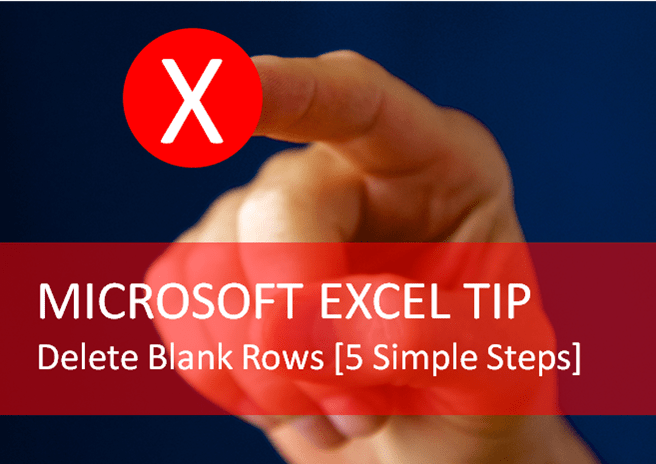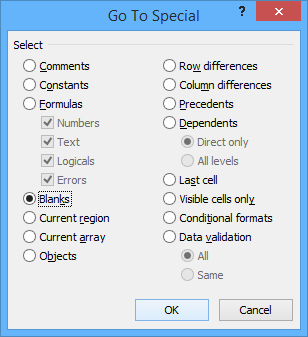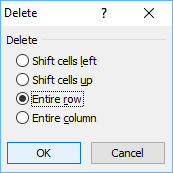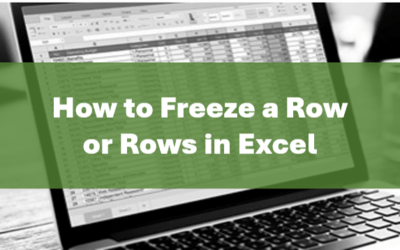Check Out This Easy Way to Find and Remove Blank Rows in Excel
by Avantix Learning Team | Updated April 7, 2021
Applies to: Microsoft® Excel® 2010, 2013, 2016, 2019 and 365 (Windows)
You can quickly find and remove blank rows in an Excel worksheet using Go To Special. You can access the Go To Special dialog box with a keyboard shortcut, use it to find blanks and then you will be able to delete blank rows quickly with a couple of clicks.
Recommended article: 15 Microsoft Excel Keyboard Shortcuts to Speed Up Formatting
Do you want to learn more about Excel? Check out our virtual classroom or live classroom Excel courses >
Below is the Go To Special dialog box:
Before you complete the following process, you may want to save a copy of the original file first.
Finding and deleting blank rows
To easily find and delete blank rows in an Excel list or data set:
- Select a column where there are blank cells in the column (we're assuming here that the rest of the row is blank). If there is sensitive data above or below the list that you don't want to delete, select the cells in the column from the first cell in the range to the last cell in the range (you could click in the first cell and Shift-click in the last cell).
- Press Ctrl + G to display the Go To dialog box and then click Special to display the Go To Special dialog box. Alternatively, you can click the Home tab in the Ribbon and then select Go To Special from the Find & Select drop-down menu.
- Select Blanks in the Go to Special dialog box and click OK. Excel will select all of the blank cells within the range.
- Right-click one of the selected blank cells and select Delete. A dialog box appears.
- Select Entire Row and click OK to confirm the delete.
You will now be able to sort, filter and create pivot tables with the list.
This article was first published on June 21, 2017 and has been updated for content and clarity.
Subscribe to get more articles like this one
Did you find this article helpful? If you would like to receive new articles, join our email list.
More resources
How to Remove Duplicates in Excel (3 Easy Ways)
How to Merge Cells in Excel (4 Ways with Shortcuts)
How to Use Flash Fill in Excel (4 Ways with Shortcuts)
How to Combine Cells in Excel Using Concatenate (3 Ways)
10 Great Excel Navigation Shortcuts to Move Around in Workbooks
Related courses
Microsoft Excel: Intermediate / Advanced
Microsoft Excel: Data Analysis with Functions, Dashboards and What-If Analysis Tools
Microsoft Excel: Introduction to Power Query to Get and Transform Data
Microsoft Excel: New and Essential Features and Functions in Excel 365
Microsoft Excel: Introduction to Visual Basic for Applications (VBA)
Our instructor-led courses are delivered in virtual classroom format or at our downtown Toronto location at 18 King Street East, Suite 1400, Toronto, Ontario, Canada (some in-person classroom courses may also be delivered at an alternate downtown Toronto location). Contact us at info@avantixlearning.ca if you'd like to arrange custom instructor-led virtual classroom or onsite training on a date that's convenient for you.
Copyright 2024 Avantix® Learning
You may also like
How to Replace Zeros (0) with Blanks in Excel
There are several strategies to replace zero values (0) with blanks in Excel. If you want to replace zero values in cells with blanks, you can use the Replace command or write a formula to return blanks. However, if you simply want to display blanks instead of zeros, you have two formatting options – create a custom number format or a conditional format.
What is Power Query in Excel?
Power Query in Excel is a powerful data transformation tool that allows you to import data from many different sources and then extract, clean, and transform the data. You will then be able to load the data into Excel or Power BI and perform further data analysis. With Power Query (also known as Get & Transform), you can set up a query once and then refresh it when new data is added. Power Query can import and clean millions of rows of data.
How to Freeze Rows in Excel (One or Multiple Rows)
You can freeze one or more rows in an Excel worksheet using the Freeze Panes command. If you freeze rows containing headings, the headings will appear when you scroll down. You can freeze columns as well so when you scroll to the right columns will be frozen.
Microsoft, the Microsoft logo, Microsoft Office and related Microsoft applications and logos are registered trademarks of Microsoft Corporation in Canada, US and other countries. All other trademarks are the property of the registered owners.
Avantix Learning |18 King Street East, Suite 1400, Toronto, Ontario, Canada M5C 1C4 | Contact us at info@avantixlearning.ca









